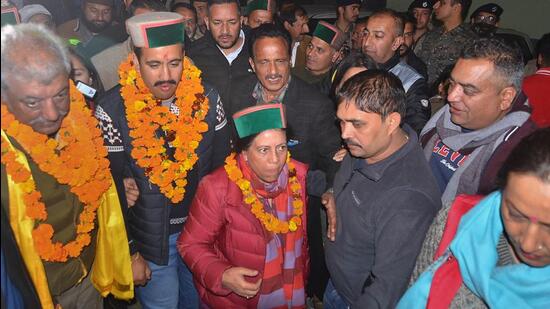Congress wrests hill state with focus on grassroots concerns
This time, the Congress fought the election without its tallest leader in the state and ran a campaign steered by his wife, Mandi MP Pratibha Singh
Keeping in line with Himachal Pradesh’s tradition of voting out the incumbent, the Congress won a simple majority in the state with 40 of the state’s 68 seats. This was four more than the 36 the party won in 2012 under then chief minister Virbhadra Singh, who formed the government that year.

This time, the party fought the election without its tallest leader in the state and ran a campaign steered by his wife, Mandi MP Pratibha Singh, who is now among the contenders to be the next chief minister of the state, along with former state unit chief Sukhvinder Singh Sukhu, who won from Nadaun, and leader of the opposition in the outgoing assembly Mukesh Agnihotri, who won from Haroli.
The Congress lawmakers will meet in Shimla to decide their next leader. Pratibha Singh, 66, did not contest the assembly polls, and if elected, she will need to be elected to the state assembly within the next six months.
Beyond Virbhadra Singh’s political legacy, the Congress victory was built on a number of key issues.
The first and the biggest was refusal of the BJP government to restore the old pension scheme (which promises better and more substantial benefits to government employees than the new plan) and its non-payment of arrears of the seventh pay commission. About 4% of the state’s population is employed in the state government, and this group also forms a vocal demographic with the ability to influence elections and discourse. Sensing this anger, the Congress promised the restoration of the old scheme in the first cabinet meeting if it formed the government. This added to the simmering discontent about inadequate government jobs. The Congress turned it into an electoral issue, promising 100,000 jobs in five years.
The second was unhappiness among apple growers. 2022 was among the worst years for apple growers in the state ; market prices fell due to apples imported from Iran and some traders complained about 18% Goods and Services Tax (tax) on apple carton boxes and cardboard trays.
Moreover, in the past five years, the state government stopped subsidised chemicals and fertilizers through the horticulture department. The Congress promised to restore this key supply. “As the government was not willing to listen to the woes of farmers, especially apple growers, there was resentment against the BJP,” said Sanjay Chauhan, co-convenor of Himachal Sanyukt Kisan Morcha.
Congress leaders said that the promise of providing ₹1,500 per month to every woman and a subsidy of ₹500 for a cooking gas cylinder helped the party win over women voters, who outnumbered men in 42 of the state’s 68 assembly constituencies.
And finally, the BJP’s poor management of internal dissension and rebellion meant that in 21 seats, rebel candidates were fighting alongside the two main parties. Results showed that the Congress won at least 12 seats due to BJP rebels.
These factors were most pronounced in the swing region of Kangra, which holds the distinction of tilting political scales since 1966. The largest district in the state sends 15 legislators to the 68-member House.
The Congress, which could win only three seats in Kangra in 2017, won 10 seats this time, while the BJP was reduced to four. Two ministers – women empowerment minister Sarveen Chaudhary and forest minister Rakesh Pathania — bit the dust. One seat went to the Independent candidate Hoshiyar Singh from Dehra.
Harish Thakur, professor of political science in Himachal Pradesh University (HPU), said that Kangra stuck to its reputation of changing the government every five years. “I am not surprised at the result from Kangra, where many factors worked against the BJP including less focus on the district as compared to Mandi, the home district of the chief minister,” he said.
While the BJP made nationalism and effective abrogation of Article 370 as its main poll planks, the Congress campaign centred around pension scheme restoration and the controversial Agnipath military recruitment scheme.
In the districts of Kangra, Hamirpur and Mandi, every second family has at least one member in the armed services or government, and unlike the cash-rich apple belt or upper Himachal, these lower Himachal districts are more dependent on religious tourism and government jobs for livelihood. BJP leaders admitted that the party failed to gauge anger against the incumbent lawmakers and local leadership, who were accused of corruption.





